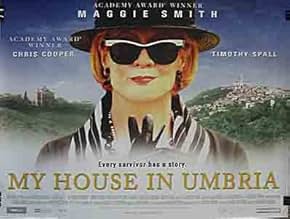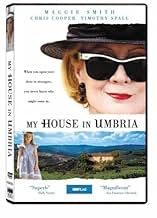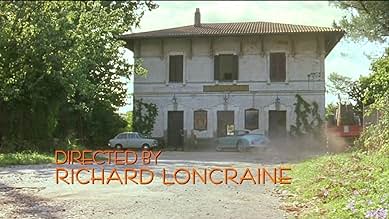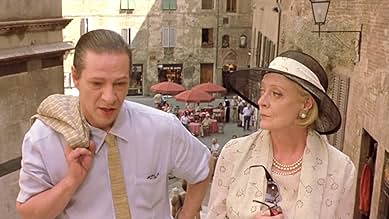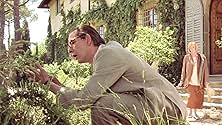IMDb RATING
6.9/10
3.9K
YOUR RATING
An unlikely group of people find solace and friendship after being thrown together in the wake of a terrorist attack.An unlikely group of people find solace and friendship after being thrown together in the wake of a terrorist attack.An unlikely group of people find solace and friendship after being thrown together in the wake of a terrorist attack.
- Director
- Writers
- Stars
- Won 1 Primetime Emmy
- 4 wins & 27 nominations total
Alison Cameron Adam
- General's Daughter
- (as Alison Adam)
Vittoria Colonna
- Young Woman
- (as Vittoria Colonna Di Stigliano)
- Director
- Writers
- All cast & crew
- Production, box office & more at IMDbPro
Featured reviews
I reserve 10 out of ten for "Tea With Mussolini". Dame Maggie gives another outstanding performance as a writer who encounters a bomb on a train. It was a way to introduce the 4 main characters (not including the fabulous Quinty) who we come to love. The clever voice overs weave a beautiful thread (by Maggie of course) tieing together a story of mutual care and affection. Mrs Delahunty loves a drink or 15 and her hospitality extends to anyone within her reach. Has she become a lonely old lady who just wants company in her secluded villa? Does it really matter that there may be a dark secret amongst her guests? No! The outside dinner scene the night before the girl Aimee was due to leave was stunning. I so hoped she wouldn't go and that the "family" would stay together........
I'd wath this again and again and will add it to my extensive collection. GO DAME MAGGIE!
I'd wath this again and again and will add it to my extensive collection. GO DAME MAGGIE!
The HBO TV movie "My House in Umbria" should be seen primarily for the complex and layered performance of divine Maggie Smith. As romance novelist Emily Delahunty, she projects an image of refinement and elegance that conceals a deeper, darker self. That self is revealed slowly, and we find hidden within a character that is not only at variance with Miss Delahunty's adopted persona, but also very different from the prim and proper ladies Maggie Smith habitually plays on the silver screen. We see that Miss Smith is capable even of being seductive and slatternly, most unlike her many repressed and spinsterish roles.
Maggie Smith has the kind of mesmerizing voice and marvelous diction that would enable her to entertain film audiences by reading the proverbial telephone book. I am reminded of Glenda Jackson's (virtual) one-woman show in "Stevie" and Joanne Woodward's voice-over of "The Age of Innocence".
The rest of the characters in "My House in Umbria" are, alas, a motley crew, sketched in only very lightly, merely second bananas to Maggie Smith's central figure. The time of the story is difficult to pin down based on the clothes and motor cars, but one imagines it takes place during the 1970s, the era of the Bader-Meinhof gang in Germany and the Red Brigades in Italy. The denouement is a little too pat, but the journey is still well worth our while.
One of the key questions raised in the film is what anger would drive a human being to commit an act of terror. But it becomes quickly apparent that political terrorism is not the only kind of "man's inhumanity to man" that is intended here. The focus is, rather, on innocence shattered and destroyed, the cruelty visited by individuals upon each other, the sense of guilt that it engenders, and the possibility of forgiveness and redemption that always, always exists if we "seize the day" and allow ourselves to be happy.
Maggie Smith has the kind of mesmerizing voice and marvelous diction that would enable her to entertain film audiences by reading the proverbial telephone book. I am reminded of Glenda Jackson's (virtual) one-woman show in "Stevie" and Joanne Woodward's voice-over of "The Age of Innocence".
The rest of the characters in "My House in Umbria" are, alas, a motley crew, sketched in only very lightly, merely second bananas to Maggie Smith's central figure. The time of the story is difficult to pin down based on the clothes and motor cars, but one imagines it takes place during the 1970s, the era of the Bader-Meinhof gang in Germany and the Red Brigades in Italy. The denouement is a little too pat, but the journey is still well worth our while.
One of the key questions raised in the film is what anger would drive a human being to commit an act of terror. But it becomes quickly apparent that political terrorism is not the only kind of "man's inhumanity to man" that is intended here. The focus is, rather, on innocence shattered and destroyed, the cruelty visited by individuals upon each other, the sense of guilt that it engenders, and the possibility of forgiveness and redemption that always, always exists if we "seize the day" and allow ourselves to be happy.
This film would immediately appeal to anyone addicted to Maggie Smith and the idyllic Italian countryside of Umbria, but it has unexpected delights to offer in its unassuming, almost art-house, flavour, and the low-key, but affecting, performances of excellent actors Timothy Spall and Ronnie Barker. Chris Cooper is rather wooden, but his academic, unemotional character casts a strong contrast to the hapless vagaries of Maggie Smith's Emily Delahuntey, and therefore works well.
Suspension of disbelief is required for the over-imaginative plot, almost out of one of Emily's romance novels. But the pleasure of such a film is simple, and simple pleasures can entertain as much as the richer, more complex enjoyment of films it might be compared with such as 'Tea With Mussolini' (which, of course, is a much fuller film in terms of plot, characters, script, and drama). 'Enchanted April' also comes to mind as another film where the Italian countryside is almost a character of the film and much more than a backdrop.
A very pleasant interlude for a winter's afternoon, or Spring evening, and Maggie Smith is as mannered and original as ever. I especially loved her flowing clothes, which suited her and her character very well.
Suspension of disbelief is required for the over-imaginative plot, almost out of one of Emily's romance novels. But the pleasure of such a film is simple, and simple pleasures can entertain as much as the richer, more complex enjoyment of films it might be compared with such as 'Tea With Mussolini' (which, of course, is a much fuller film in terms of plot, characters, script, and drama). 'Enchanted April' also comes to mind as another film where the Italian countryside is almost a character of the film and much more than a backdrop.
A very pleasant interlude for a winter's afternoon, or Spring evening, and Maggie Smith is as mannered and original as ever. I especially loved her flowing clothes, which suited her and her character very well.
10diane-34
Seeing Maggie Smith's character start the day with a wee glass of grappa and end her day with another is not exactly what we have come to expect from this marvelous actor but these twists in William Trevor's novella are precisely what the viewer is presented with throughout this wonderful film. My statement is in no way meant to denigrate the scrip-it simply is a signpost indicating the varied paths that the viewer follows as the film progresses.
The visual beauty of the film is taken for granted because of its magical setting-it's just the many little detours taken by the characters during the course of the unfolding drama that kept this poor viewer from anticipating the unfolding script changes. I saw a film I didn't quite expect to see because the early publicity seemed to gloss over these script changes. However, the resulting movie was better and more interesting than any I could have predicted-in part due to the remarkable acting of the cast.
Maggie's character is the mover of the film and all events revolve around her. Her character is strangely ambivalent in that she at first sight is this straight laced woman who appears to do everything "properly" but as the film unfolds she shows many more aspects to her role. For me it was similar to watching an onion being peeled and I found each underlying layer more interesting than the previous. Chris Cooper's character was also intrigued by this unfolding but he didn't find what he saw as interesting as I did.
Try to watch this lovely, interesting film-you can spend your time in a theater in far worse ways.
The visual beauty of the film is taken for granted because of its magical setting-it's just the many little detours taken by the characters during the course of the unfolding drama that kept this poor viewer from anticipating the unfolding script changes. I saw a film I didn't quite expect to see because the early publicity seemed to gloss over these script changes. However, the resulting movie was better and more interesting than any I could have predicted-in part due to the remarkable acting of the cast.
Maggie's character is the mover of the film and all events revolve around her. Her character is strangely ambivalent in that she at first sight is this straight laced woman who appears to do everything "properly" but as the film unfolds she shows many more aspects to her role. For me it was similar to watching an onion being peeled and I found each underlying layer more interesting than the previous. Chris Cooper's character was also intrigued by this unfolding but he didn't find what he saw as interesting as I did.
Try to watch this lovely, interesting film-you can spend your time in a theater in far worse ways.
Having just seen this film in the cinema, I have to say it didn't flag at all, and it was graced by one of Maggie Smith's greatest performances - and which fully deserved her Emmy award. The film dramatises the necessary illusions with which we need to live our lives. For Emily Delahunty, alcohol and the escapism of the romance fiction she writes are the props to her very existence. To keep sane the illusion of happiness sometimes is necessary to keep going. And yet, out of tragedy comes the hint of salvation: some kind of family, and a girl who becomes a symbol of how she can have hope for the future. This is not a cosy film, as some misguided critics have labelled it. It is not gardens, Italy, cups of tea: it is a film of illusion, escapism, isolation and the human spirit in the face of tragedy and death. Released in the UK after the quaint "Ladies in Lavender" it was unfortunately seen by the critics as exactly the same kind of film - and so missing the point completely.
Playing the troubled alcoholic, a vulnerable ageing romance novelist, Smith is on amazing form. Never mannered, she is perfect in her second role in a William Trevor novella (her first was in the 1984 "Mrs Silly" for ITV in the UK, for which she was nominated for a BAFTA). Using those expressive eyes, and a crushed, occasionally slurred voice, she draws you into the film. If this makes me sound like a Smith groupie, I have to point out that I disliked intensely this actress's mannered caricatures in such films as "Tea with Mussolini" or "Washington Square" (though, faced with the awful scripts, maybe she decided just to push it for laughs...). That is why she deserves recognition for this film: she reminds us that, with the right material, she can be the best - and not just the witty old bat in "Gosford Park" or the the stern teacher in "Harry Potter". After Smith's Emmy award, it was criminal that Meryl Streep robbed Dame Maggie at the Golden Globes for her raiding of the dressing-up box in "Angels in America".
For the supporting cast, Ronnie Barker, Timothy Spall, and Chris Cooper are all superb: understated, natural, and working in a brilliant ensemble. They have such rapport with Smith that the film just whizzes by.
Playing the troubled alcoholic, a vulnerable ageing romance novelist, Smith is on amazing form. Never mannered, she is perfect in her second role in a William Trevor novella (her first was in the 1984 "Mrs Silly" for ITV in the UK, for which she was nominated for a BAFTA). Using those expressive eyes, and a crushed, occasionally slurred voice, she draws you into the film. If this makes me sound like a Smith groupie, I have to point out that I disliked intensely this actress's mannered caricatures in such films as "Tea with Mussolini" or "Washington Square" (though, faced with the awful scripts, maybe she decided just to push it for laughs...). That is why she deserves recognition for this film: she reminds us that, with the right material, she can be the best - and not just the witty old bat in "Gosford Park" or the the stern teacher in "Harry Potter". After Smith's Emmy award, it was criminal that Meryl Streep robbed Dame Maggie at the Golden Globes for her raiding of the dressing-up box in "Angels in America".
For the supporting cast, Ronnie Barker, Timothy Spall, and Chris Cooper are all superb: understated, natural, and working in a brilliant ensemble. They have such rapport with Smith that the film just whizzes by.
Did you know
- TriviaMrs. Emily Delahunty's (Dame Maggie Smith's) car is an Alfa Romeo 6C-2500, produced between 1947 and 1953. It is a five-seat touring car popular with affluent post-war customers interested in a sporty yet comfortable vehicle.
- Quotes
Mrs. Emily Delahunty: In the garden, delphiniums were in flower. Through scented twilight, the girl in the white dress walked with a step as light as a morning cobweb. That evening she hadn't a care in the world.
Details
- Release date
- Countries of origin
- Official site
- Languages
- Also known as
- Mitt hus i Umbrien
- Filming locations
- Production companies
- See more company credits at IMDbPro
Box office
- Gross worldwide
- $1,324,900
- Runtime
- 1h 43m(103 min)
- Color
- Sound mix
- Aspect ratio
- 1.85 : 1
Contribute to this page
Suggest an edit or add missing content

